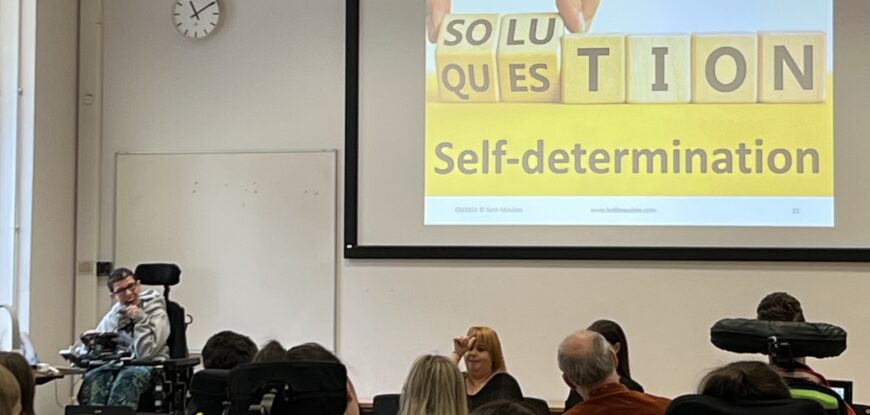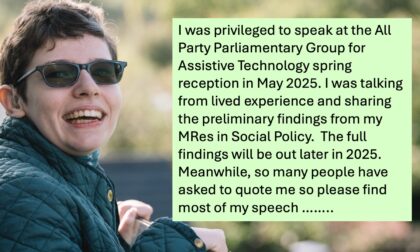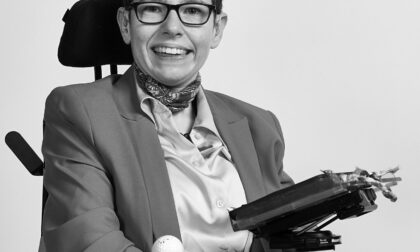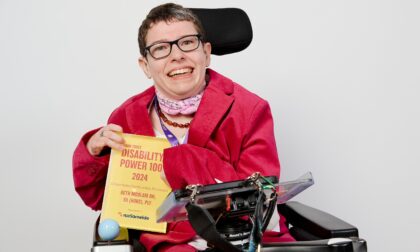I find this an interesting question: Who is a professional? Am I a professional? What makes someone a professional in their own eyes and in the eyes of others? In my mind, I often have imposter syndrome; how is it possible that I can be doing the things I’m doing? Am I doing these things because I have lived experience, or in my chosen field, am I a professional? Does it even matter? The question ‘Who or what is a professional?’ arose because there was an opportunity for ‘professionals to apply’. If I chose to apply would I qualify or not?
Definitions of ‘professional’
The dictionary definition of a professional is ‘doing something as a paid job rather than a hobby’ (Oxford Dictionary, 2024). Of course, there are professionals who are qualified and members of a professional body. However, many ‘professions’ don’t require membership in a professional body yet they operate professionally.
My reliance on personal assistants, needing extra time to achieve, and my physical abilities make it challenging to be in paid work, even though I can wish. Everything takes much longer. I need the support of a personal assistant in most aspects of my life, they are my hands for physical tasks daily. Then my capacity to work on either a voluntary, or paid basis, is restricted by my fatigue to shorter days and longer rest periods.
Ultimately, everything I do is based on my passion for empowering others to fulfil their own communication potential. Just because I cannot undertake paid work does this mean that everything I do is a hobby? A hobby is ‘an activity that you do for pleasure when you are not working’ (Cambridge Dictionary, 2024) and ‘a pursuit outside one’s regular occupation engaged in especially for relaxation’ (Merriam-Webster, 2024). I love what I do, it is my way of giving back, but I cannot claim it is for relaxation.
Can an AAC user be a professional?
First and foremost, this post is a genuine question, am I a professional? If I had no disability, but was active in my chosen vocation, and paid, I would be a professional. Or, because I have a passion for empowering others who use AAC to fulfil their own communication potential am I just an outspoken AAC user with a hobby?
After playing my chosen sport for 17 years I reached the pinnacle of my world-class elite career. I was fortunate to achieve my dream by representing Great Britain in boccia, at the Tokyo 2020 (2021) Paralympics. To perform on a world-class stage in any sport takes years of dedication, hard work, and resilience. I may have started to dream of representing my nation at 6 years old. I was lucky I eventually found my sport aged 10 years. This led to scaling the ladder to become a Paralympian receiving a National Lottery Award for my training. I chose to retire because my body could not sustain the intense training and competition regimes. However, whilst I was a part of it I was privileged to be a professional athlete.
I wondered if I could apply this same logic to the world of AAC. Does hard work and achievement make us professional as AAC users? Sometimes it seems that ‘professionals’ know a lot across a breadth of topics around their subject. This is good, and we need these professionals in our lives. On the other hand, those with lived experience have considerable, often unique, in-depth knowledge of their own situation. They will be expert in their own communication systems. Usually, they’ll have spent substantial time on their own research, and know what works for them. The dilemma here is balancing professional expertise with expert lived experience, how do we value both?
Does experience count?
I started speaking publicly at age 12 and loved the experience so much that for over 18 years it has become more than a hobby. The content of what I share has been grounded in my life experience. However, more recently my life experience is also coloured by my academic and research interests in social policy, my sporting achievement, and advocating for AAC users. Whenever I present my content is always tailored to my audience, their goals, and their objectives. I take my role seriously, raising awareness and advocating for others so participants leave with key messages and actions is important to me.
Public speaking and lived experience led to me delivering training and workshops around a variety of topics. These are for AAC users, families, and professionals and I cover a wide range of topics. Whilst I am often asked to speak from lived experience, I also get the opportunity to share research, evidence, information, and experiences of other subjects. I develop and write all my own material. I’m trusted to go into schools, youth groups, colleges, and social care organisations. Further, I lecture on communication impairment and safeguarding for higher education students. I’m not just there to share my experiences or be a role model. I’m there to educate and raise professional standards.
Is professionalism a transferrable skill?
Whilst an athlete I studied full time for an undergraduate degree in Social Policy, over 7 years. After achieving this I had 18 months out to focus on sport and returned to study full time in 2022. My full-time study is a little different from other people’s as it takes me longer to do things. My Masters by Research is being completed over 3 years instead of the usual 1 year. My dissertation is around AAC policy and provision, an identified gap in an immature field. I aim to add to the body of knowledge needed to develop the field of AAC provision. I’m a post-graduate student focusing on an area in which I have knowledge and experience.
For years I’ve had an on-and-off relationship depending on my studies with the International Society of Augmentative and Alternative Communication (ISAAC) supporting the LEAD committee. LEAD is the group that supports AAC users around the world representing their views and encouraging active participation in leadership roles. I’m shortly due to take on the Chair of this group which also means I will sit on the Executive Board of ISAAC. Since retiring from the sport, I was invited to be Patron of 1 Voice, a charity for children and young people who use AAC. I’ve been elected to the Board of Communication Matters. Then, for the last 4 years, I’ve been on the International Communication Rights Alliance (ICRA) committee where I am focused on policy using the skills I have learned in academia. In this role, I have twice been privileged to address the UNCRPD committee on communication rights.
What value is there in public acclaim?
In 2023 I was nominated as one of the top UK 100 disability influencers. To be named in the Disability Power 100 list as a top 10 community advocate felt really rewarding. Especially as all I have done is work with my passion for empowering other AAC users. In 2024 I was awarded by Manchester Metropolitan University an honorary degree as Doctor of Health for my advocacy work and being a Paralympian. Could public acclaim grounded in my lived experience allow me to think of myself as a professional in my chosen field?
Is professionalism self-acclaimed?
For many years my identity was as an AAC user first. Then I realised that I was no longer introducing myself as someone disabled or an AAC user, but as a Paralympian, a post-grad student, and for my advocacy work. I began to understand that as an individual I was no longer focused on my lived experience, but on my achievements and on the future. I’ve had a wonderful 26 years learning my trade and doing an apprenticeship which is unique to me. So where now?
Having said all this, I come back to imposter syndrome. Yes, I’ve achieved a lot but I’m still learning about life and don’t feel I’ve reached my destination yet. I’m continuing my studies and I have hope for where this takes me. So, does this success, and my future potential make me just an AAC user with lived experience?
Who is a professional?
I’ve put forward my own case, but we need to look at the wider AAC world. I know many AAC users and their family members. We come in all shapes and sizes, with a myriad of different experiences not just from within the field of AAC. What we all share is passion and knowledge of AAC, not just in a 9 to 5 working day but 24/7 in life as we live and breathe personal communication. Is it time to reflect and evaluate when we think about professionalism and put us all on an equal footing?





If you found this interesting or
helpful please feel free to share.